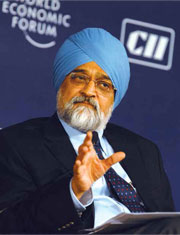
You should keep your mind open on all important issues and weigh them because it is not very obvious what the answers are and you know the answers also change over time and with circumstances. Please keep in mind that there is no one correct answer. I remember, as a student, there used to be a joke, which was frequently told before the examination – that, in an examination, one student raised his hand and said to the invigilator, ‘Sir, I think there has been a mistake, because this is last year’s question paper.’ He was told, ‘My dear boy, the questions are always the same, it is the answers that change’. That was a joke at that time but as I get older, I realise that perceptions change over time and therefore it is very important to keep an open mind.
My subject for this talk is, ‘Multinational Corporations: Are they Saviours or Saboteurs?’ The short answer is they are neither. It is quite wrong to treat them as saviours; I don’t think MNCs by themselves will solve problems. I think it is also wrong to call them saboteurs. Now having said that, I am very aware that in the political sector, both the extreme left and the extreme right, are very anti-MNCs. But I think you need to take a balanced view and look at the issue in that perspective. And my view is - the impact of a Multinational Corporation, depends on where it is or period in which it operates.
For example, historically, there is no doubt that The East India Company was a highly exploitative multinational corporation. It wasn’t simply engaged in competitive trading - it was actually using the political/military power of the colonial rulers to essentially extract as much surplus as it could. So there is no question that the impact of the multinational was negative of course. That is not only true of India’s experience; it’s true of China, when, in the mid-19th century, you had opium wars and Europeans forcibly opened up China to trade for political control. It is also true in Latin America, in the 1950s-1960s. United Fruit Company single- handedly but on the strength of American political power controlled small economy. Now in that environment there is simply no question that the multinationals are an extension of the colonial power. However, that is not the environment they are in today. In an environment where nations are sovereign and can protect their sovereignty, multinationals compete in markets not just with themselves but also with Indian companies. Furthermore, the kind of world you want is where Indian companies begin to compete with multinationals and indeed go abroad to compete in foreign markets. Quite honestly, the only real sign that we succeed is if in competition we can beat the MNC.

Baba Ramdev among the many things he does, has promoted Patanjali and is giving a stiff fight to multinationals. I applaud that, for it is the right approach. There are many others who are doing that - makers of Indian snack foods which are becoming quite popular, thanks to globalisation of taste. I mean there are one million Indians in America and real test of competitive success would be more and more of them start producing on their table, Indian food products. That way our companies can also be multinational.
But the other side of coin is we should be quite willing to have multinationals coming. Now look at it from the point of view of trade policy. ‘Are you in favour of allowing reasonably free import? Now if you are, then it doesn’t make sense to say to the multinational that, look you can import, you can send the products here but don’t make it here.’ In fact the ‘Make in India’ campaign, when it was started, what the Prime Minister was saying that, ‘Look I invite all the foreign companies to make in India; the idea was - why just importing, why can’t we make in India?’ So let’s be very clear about it this.
It is very important to recognise that we are living in a global economy; we cannot and should not shut the door. Chinese Prime Minister Wen Jiabao once said in Singapore, that Chinese history shows that whenever China closed itself off, it did poorly...
It is very important to recognise that we are living in a global economy; we cannot and should not shut the door. Chinese Prime Minister Wen Jiabao once said in Singapore, that Chinese history shows that whenever China closed itself off, it did poorly and when China opened up, it did well. Recently, President Xi Jinping in Davos said, more or less the same thing; he said ‘It is a bad idea. You can always shut your doors and windows and think you have kept the wind and the rain out, but you also keep the light out’. That is the fundamental point - that an economy must be open, it must import, and it must export. Certainly, our experience with the opening up of economy, during 80s-90s—a policy that has been continued by several different governments of all political complexions. That process of opening up has undoubtedly been favoured. In terms of overall economic growth of the country and even in reduction in poverty, the experience has been very good, so it follows that if you don’t have an open economy, you must encourage Indian companies to go abroad and compete and must encourage foreign companies to come in.
I will just remind you of the experience we have in the automotive sector. Way back when I was a student, there were only two cars you could buy in the country - the Ambassador and the Padmini. Both produced by Indian companies, they did not change for 30-40 years. The change in the automotive sector came when Maruti as a public sector company was setup and it brought in Suzuki. The clear decision was taken that it is not possible to produce a good car without bringing in technology, because the original idea was to produce an indigenous car. They brought in Suzuki and overtime, Suzuki was interested in increasing its own equity and internationally we had opened up economy by the 90s. More and more automotive companies from outside came and since then completely indigenous design of an automobile by the Tata’s came in - they even export some.
I think we are going for a success in an open environment and that means we also have to allow multinationals to operate.
by Montek Singh Ahluwalia